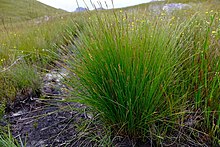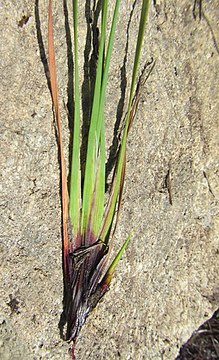Schoenus (plant)
| Schoenus | |
|---|---|

| |
| Schoenus nigricans (Black bogrush) in South Africa. This is the most widespread of all Schoenus species. | |
| Scientific classification | |
| Kingdom: | Plantae |
| Clade: | Tracheophytes |
| Clade: | Angiosperms |
| Clade: | Monocots |
| Clade: | Commelinids |
| Order: | Poales |
| Family: | Cyperaceae |
| Genus: | Schoenus L. |

| |
| Species richness of Schoenus mapped according to botanical regions | |
| Synonyms[1] | |
| |
Schoenus is a predominately austral genus of sedges,[2] commonly known as bogrushes,[3] or veldrushes in South Africa. Species of this genus occur mainly in South Africa (some 44 species), Australia (some 70 species) and Southeast Asia.[4] Others are found in scattered locations worldwide, from Europe (2 species) to Asia, North Africa (1 species) and the Americas.[5][6][7][8][9][10] Three species occur in the peatlands of southern South America, including S. antarcticus which is found in Tierra del Fuego, where it forms a component of hyperhumid Magellanic moorland.[11]
Taxonomic attention to the South African taxa, starting 2017, revealed a wealth of species. Twenty-four species were transferred from Tetraria and Epischoenus into Schoenus, and several new species were described. S. inconspicuus, discovered on the outskirts of Cape Town, consists of only a few specimens.[2]
Etymology
[edit]The Greek word schoinos means 'rush', 'reed' or 'coord'.[12] Schoenus has also been used to represent ancient Egyptian, Greek and Roman units of length and area based on knotted cords. In addition, it was the name of several ancient Greek towns, which were located in Arcadia, Boeotia and Corinthia, as well as several individuals in Greek mythology.
Description
[edit]Similar to other sedges (plants in family Cyperaceae), Schoenus are graminoid (grass-like) monocotyledonous flowering plants. Most species of Schoenus usually grow in clumps, but a few species are more spreading in growth form.[13] The flowering stems (culms) of Schoenus are usually round (terete), but there are some species with angular (e.g. Schoenus quadrangularis) or flat (e.g. Schoenus complanatus) culms.[13][14] Leaves of Schoenus are serrate, basal and usually well-developed, but there are some species with leaves reduced to a sheath (e.g. Schoenus gracillimus).[13][14] Several species are hairy (e.g. Schoenus neovillosus), but in this genus it is not common to have hairs.[14][15][16][17]
-
Round flowering stems of Schoenus lucidus
-
Angled flowering stems
-
Flat flowering stems of Schoenus complanatus
Schoenus species
[edit]



As of November 2024[update], the Plants of the World Online database indicates there are 154 species of Schoenus. [18]
Bogrushes
- Schoenus absconditus Kük. ― Hidden bogrush
- Schoenus achaetus (T.Koyama) T.Koyama
- Schoenus acuminatus R.Br.
- Schoenus andinus (Phil.) H.Pfeiff.
- Schoenus andrewsii W.Fitzg.
- Schoenus antarcticus (Hook.f.) Dusén
- Schoenus apogon Roem. & Schult. ― Smooth bogrush
- Schoenus armeria (Nees) Boeckeler
- Schoenus asperocarpus F.Muell.
- Schoenus badius Rye
- Schoenus benthamii F.Muell.
- Schoenus bifidus (Nees) Boeckeler
- Schoenus biglumis Kük.
- Schoenus breviculmis Benth. ― Matted bogrush
- Schoenus brevifolius R.Br. ― Zig-zag bogrush
- Schoenus brevisetis (R.Br.) Roem. & Schult.
- Schoenus caespititius W.Fitzg.
- Schoenus calcatus K.L.Wilson
- Schoenus calostachyus (R.Br.) Roem. & Schult.
- Schoenus calyptratus Kük. ― Alpine bogrush
- Schoenus capillifolius D.A.Cooke
- Schoenus carsei Cheeseman
- Schoenus centralis Latz
- Schoenus clandestinus S.T.Blake
- Schoenus coultasii Hislop
- Schoenus cruentus (Nees) Benth.
- Schoenus curvulus F.Muell.
- Schoenus cygneus (Nees) Nees
- Schoenus deformis (R.Br.) Roem. & Schult.
- Schoenus delicatulus (Fernald) J.Kern
- Schoenus discifer Tate
- Schoenus efoliatus F.Muell.
- Schoenus elegans S.T.Blake
- Schoenus ericetorum R.Br. ― Heath bogrush
- Schoenus evansianus K.L.Wilson
- Schoenus falcatus R.Br. ― Sickle bog-rush
- Schoenus ferrugineus L. ― Brown bog-rush, endemic to Europe
- Schoenus fluitans Hook.f. ― Floating veldrush
- Schoenus globifer Nees
- Schoenus grammatophyllus F.Muell.
- Schoenus griffinianus K.L.Wilson
- Schoenus hexandrus F.Muell. & Tate
- Schoenus humilis Benth.
- Schoenus imberbis R.Br. ― Beardless bogrush
- Schoenus indutus Benth.
- Schoenus insolitus K.L.Wilson
- Schoenus kennyi (F.M.Bailey) S.T.Blake ― Kenny's bog-rush
- Schoenus laevigatus W.Fitzg.
- Schoenus laevinux (Kük.) Ohwi
- Schoenus lanatus Labill.
- Schoenus latelaminatus Kük. ― Medusa bogrush
- Schoenus latitans S.T.Blake
- Schoenus lepidosperma (F.Muell.) K.L.Wilson
- Schoenus loliaceus Kük.
- Schoenus longibracteatus Kük.
- Schoenus lymansmithii M.T.Strong
- Schoenus maschalinus Roem. & Schult. ― Dwarf bogrush
- Schoenus melanostachys R.Br. ― Black bogrush
- Schoenus minutulus F.Muell.
- Schoenus moorei Benth.
- Schoenus multiglumis Benth.
- Schoenus nanus (Nees) Benth. ― Tiny bogrush
- Schoenus natans (F.Muell.) Benth.
- Schoenus neocaledonicus C.B.Clarke
- Schoenus nigricans L. ― Black sedge, cosmopolitan range
- Schoenus nitens (R.Br.) Roem. & Schult. ― Shiny bogrush
- Schoenus nudifructus C.Chen
- Schoenus obtusifolius (Nees) Boeckeler
- Schoenus odontocarpus F.Muell.
- Schoenus ornithopodioides (Kük.) S.T.Blake ― Bird's foot bogrush
- Schoenus pauciflorus (Hook.f.) Hook.f. ― Sedge tussock
- Schoenus pedicellatus (R.Br.) Roem. & Schult.
- Schoenus pennisetis S.T.Blake
- Schoenus pleiostemoneus F.Muell.
- Schoenus plumosus Rye
- Schoenus punctatus R.Br.
- Schoenus pygmaeus S.T.Blake ― Pigmy bogrush
- Schoenus racemosus J.M.Black ― Branched bogrush
- Schoenus rhynchosporoides (Steud.) Kük.
- Schoenus rigens S.T.Blake
- Schoenus rivularis J.Raynal ex K.L.Wilson
- Schoenus rodwayanus W.Fitzg.
- Schoenus rupicola P.M.Musili & J.J.Bruhl
- Schoenus scabripes Benth.
- Schoenus sculptus (Nees) Boeckeler ― Gimlet foot bogrush
- Schoenus sesquispicula C.B.Clarke
- Schoenus setiformis S.T.Blake
- Schoenus sinensis Hand.-Mazz.
- Schoenus smitinandii T.Koyama
- Schoenus sparteus R.Br. ― Broom bogrush
- Schoenus subaphyllus Kük. ― Desert bogrush
- Schoenus subbarbatus Kük.
- Schoenus subfascicularis Kük.
- Schoenus subflavus Kük.
- Schoenus sublateralis (Steud.) C.B.Clarke
- Schoenus sublaxus Kük.
- Schoenus submicrostachyus Kük.
- Schoenus tendo (Hook.f.) Hook.f.
- Schoenus tenellus Benth.
- Schoenus tenuissimus Benth.
- Schoenus tesquorum J.M.Black
- Schoenus thedae M.D.Barrett & R.L.Barrett
- Schoenus trachycarpus F.Muell.
- Schoenus unispiculatus F.Muell. ex Benth.
- Schoenus vaginatus Benth.
- Schoenus variicellae Rye
- Schoenus villosus R.Br. ― Hairy bogrush
- Schoenus yarrabensis Domin
The genus Schoenus includes 44 species from the southern Africa Schoenus clade, which are divided into three main groups.[14]
Veldrushes
Schoenus cuspidatus group[14]

- Schoenus auritus (Nees) T.L.Elliott & Muasya ― Fleshy veldrush
- Schoenus australis T.L.Elliott & Muasya ― Southern veldrush
- Schoenus bolusii (C.B.Clarke) T.L.Elliott & Muasya ― Spotted veldrush
- Schoenus brunnescens ― Brown veldrush
- Schoenus calceolus T.L.Elliott & Muasya ― Limestone veldrush
- Schoenus compactus (Levyns) T.L.Elliott & Muasya ― Congested veldrush
- Schoenus crassiculmis (Levyns) T.L.Elliott & Muasya ― Succulent veldrush
- Schoenus crassus (Levyns) T.L.Elliott & Muasya ― Robust veldrush
- Schoenus cuspidatus Rottb. ― Sharp veldrush
- Schoenus exilis (Levyns) T.L.Elliott & Muasya ― Small veldrush
- Schoenus galpinii (Schönland & Turrill) T.L.Elliott & Muasya ― Mountain veldrush
- Schoenus graciliculmis T.L.Elliott & Muasya ― Delicate veldrush
- Schoenus graminifolius (Levyns) T.L.Elliott & Muasya ― Grassleaf veldrush
- Schoenus inconspicuus ― Hidden veldrush
- Schoenus ligulatus Kuntze ― Strap veldrush
- Schoenus limosus T.L.Elliott & Muasya ― Muddy veldrush
- Schoenus loreus ― Flatleaf veldrush
- Schoenus prophyllus T.L.Elliott & Muasya ― Bract veldrush
- Schoenus purpurascens T.L.Elliott & Muasya ― Purple veldrush
- Schoenus quartziticus T.L.Elliott & Muasya ― Quartz veldrush
- Schoenus riparius T.L.Elliott & Muasya ― River veldrush
- Schoenus submarginalis T.L.Elliott & Muasya ― Marginal veldrush
Epischoenus group[14]

- Schoenus adnatus (Levyns) T.L.Elliott & Muasya ― Flat veldrush
- Schoenus complanatus (Levyns) T.L.Elliott & Muasya ― Flat veldrush
- Schoenus crinitus T.L.Elliott & Muasya ― Downy veldrush
- Schoenus dregeanus (Boeckeler) Kuntze ― Slim veldrush
- Schoenus gracillimus T.L.Elliott & Muasya ― Slender veldrush
- Schoenus lucidus (C.B.Clarke) T.L.Elliott & Muasya ― Bright veldrush
- Schoenus neovillosus T.L.Elliott & Muasya ― Hairy veldrush
- Schoenus quadrangularis Boeckeler ― Square veldrush
- Schoenus rigidus T.L.Elliott & Muasya ― Ridge veldrush
- Schoenus schonlandii (Turrill) T.L.Elliott & Muasya ― Eastern veldrush
- Schoenus selinae T.L.Elliott, Muthaphuli & Muasya ― Auricle veldrush
Schoenus compar - Schoenus pictus group[14]

- Schoenus albovaginatus T.L.Elliott & Muasya ― Whitesheath veldrush
- Schoenus arenicola T.L.Elliott & Muasya ― Sand veldrush
- Schoenus aureus T.L.Elliott & Muasya ― Gold veldrush
- Schoenus compar L. ― Ivory veldrush
- Schoenus comparoides T.L.Elliott & Muasya ― Foothill veldrush
- Schoenus megacarpus T.L.Elliott & Muasya ― Bignut veldrush
- Schoenus pictus (Boeckeler) Kuntze ― Yellow veldrush
- Schoenus pseudoloreus (Kük.) T.L.Elliott & Muasya ― Eared veldrush
- Schoenus triticoides T.L.Elliott & Muasya ― Wheat veldrush
Unplaced species
- Schoenus bracteosus (C.B.Clarke) T.L.Elliott & Muasya ― Bristleglume veldrush
- Schoenus filiculmis T.L.Elliott & Muasya ― Wiry veldrush
Synonyms (yet to be incorporated in Plants of the World Online database)
- Schoenus adnatus (Levyns) T.L.Elliott & Muasya = synonym of Schoenus tenuellus T.L.Elliott & Muasya[14]
References
[edit]- ^ "Kew World Checklist of Selected Plant Families". Retrieved 23 July 2014.
- ^ a b Elliott, Tammy Lynn; Euston-Brown, Doug I. W.; Muasya, A. Muthama (28 April 2020). "Schoenus inconspicuus (Cyperaceae, tribe Schoeneae): a new species from Southern Africa". Phytotaxa. 440 (3): 239–244. doi:10.11646/phytotaxa.440.3.6. S2CID 219006040. Retrieved 12 May 2021.
- ^ NRCS. "Schoenus". PLANTS Database. United States Department of Agriculture (USDA). Retrieved 7 November 2015.
- ^ "Schoenus L." Plants of the World Online. Board of Trustees of the Royal Botanic Gardens, Kew. 2022. Retrieved 28 September 2022.
- ^ "Atlas of Living Australia". Retrieved 23 July 2014.
- ^ New South Wales Flora On-line
- ^ Govaerts, R. & Simpson, D.A. (2007). World Checklist of Cyperaceae. Sedges: 1-765. The Board of Trustees of the Royal Botanic Gardens, Kew.
- ^ Flora of China, Vol. 23 Page 256, 赤箭莎属 chi jian suo shu, Schoenus Linnaeus, Sp. Pl. 1: 42. 1753.
- ^ "Schoenus of Western Australia". FloraBase. Retrieved 23 July 2014.
- ^ "USDA Plants Profile: North American Species". Retrieved 23 July 2014.
- ^ Rydin, Håkan; Jeglum, John K. (2013-07-18). The Biology of Peatlands (Biology of Habitats Series) (2 ed.). OUP Oxford. p. 238. ISBN 9780191508288.
- ^ Quattrocchi, Umberto (2023). CRC World Dictionary of Plant Names: Common Names, Scientific Names, Eponyms. Synonyms, and Etymology – Volume IV R–Z. CRC Press.
- ^ a b c Larridon, Isabel; Zuntini, Alexandre R.; Léveillé-Bourret, Étienne; Barrett, Russell L.; Starr, Julian R.; Muasya, A. Muthama; Villaverde, Tamara; Bauters, Kenneth; Brewer, Grace E.; Bruhl, Jeremy J.; Costa, Suzana M.; Elliott, Tammy L.; Epitawalage, Niroshini; Escudero, Marcial; Fairlie, Isabel; Goetghebeur, Paul; Hipp, Andrew L.; Jiménez-Mejías, Pedro; Sabino Kikuchi, Izai A.B.; Luceño, Modesto; Márquez-Corro, José Ignacio; Martín-Bravo, Santiago; Maurin, Olivier; Pokorny, Lisa; Roalson, Eric H.; Semmouri, Ilias; Simpson, David A.; Spalink, Daniel; Thomas, W. Wayt; Wilson, Karen L.; Xanthos, Martin; Forest, Félix; Baker, William J. (1 July 2021). "A new classification of Cyperaceae (Poales) supported by phylogenomic data". Journal of Systematics and Evolution. 59 (4): 852–895. doi:10.1111/jse.12757. hdl:1854/LU-8709768.
- ^ a b c d e f g h i Elliott, T.L.; Muasya, A.M. (2020). "A taxonomic revision of the Epischoenus group of Schoenus (Cyperaceae, tribe Schoeneae)". South African Journal of Botany. 135: 296–316. doi:10.1016/j.sajb.2020.08.029.
- ^ Elliott, T.L.; Muasya, A.M. (2017). "Taxonomic realignment in the southern African Tetraria (Cyperaceae, tribe Schoeneae; Schoenus clade)". South African Journal of Botany. 112: 354–360. doi:10.1016/j.sajb.2017.06.011.
- ^ Elliott, T.L.; Muasya, A.M. (2018). "A taxonomic revision of Schoenus compar - Schoenus pictus and allies (Cyperaceae, tribe Schoeneae) with three new species described from South Africa". South African Journal of Botany. 114: 303–315. doi:10.1016/j.sajb.2017.11.020.
- ^ Elliott, T.L.; Barrett, R.L.; Muasya, A.M. (2019). "A taxonomic revision of Schoenus cuspidatus and allies (Cyperaceae, tribe Schoeneae)—Part 1". South African Journal of Botany. 121: 519–535. doi:10.1016/j.sajb.2018.11.021.
- ^ "Schoenus L. | Plants of the World Online | Kew Science". Plants of the World Online. Retrieved 2024-11-12.



